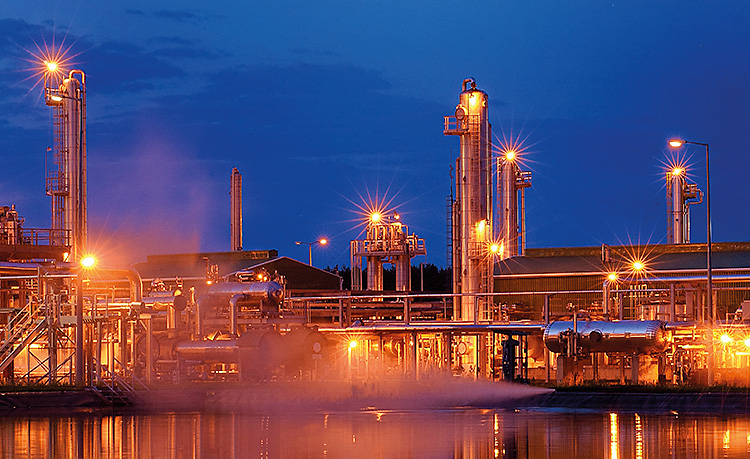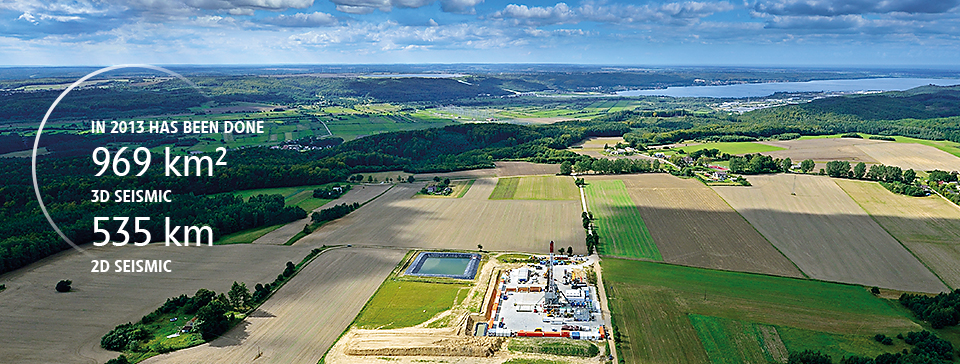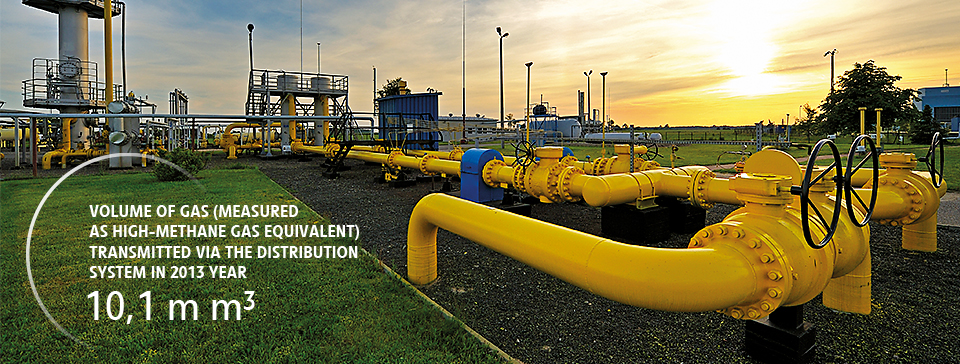Trade and Storage
The 2013 gas sales reached 16.2 bn m³, with the Trade and Storage segment sales accounting for 95.5% (15.47 bn m³) of that figure. Gas sales by PST constituted nearly 1.4 bn m³. In 2013, the segment also sold 4,714 GWh of electricity, 60% of which was to the Polish market.
Key events
- Execution, on March 20th 2013, of an annex to Contract No. 2102-14/RZ-1/25/96 with OAO Gazprom/OOO Gazprom Export of September 25th 1996 for the sale of natural gas to the Republic of Poland. Under the annex, the parties agreed to increase the maximum daily offtake of gas at the Vysokoye cross-border point to 15 m m³ (GOST), with annual contracted volumes remaining unchanged. The annex provided that the option to offtake the increased volume of natural gas would be applicable over five consecutive days from the moment when the parties agreed to begin the offtake of such increased volume.
- Execution, on October 25th 2013, of a Framework Agreement for the sale/purchase of natural gas with DTEK Trading Sp. z o.o. of Ukraine.
Under the Framework Agreement, the parties executed three contracts for gas supply, under which DTEK Trading purchased 83,896,193 m³ (according to Polish Standards – PN) of natural gas from PGNiG. - Execution, on November 6th 2013, of an agreement terminating the Natural Gas Supply Agreement of October 26th 2004 between PGNiG and the National Joint-Stock Company Naftogaz Ukrainy of Kiev, Ukraine (‘Naftogaz Ukrainy’).
During the consultation process, the parties agreed to take steps to terminate the Agreement, which was to be effective until 2020. The decision to terminate the Agreement will not preclude any future cooperation with the Ukrainian partner on newly agreed terms.
Termination of the Agreement of October 26th 2004 between Naftogaz Ukrainy and PGNiG will have no impact on the Polish economy.
PGNiG customers in the Hrubieszów area will be receiving natural gas from the Polish transmission system through the Lubaczów-Krasnystaw gas pipeline.

Financial performance in 2013
The Trade and Storage segment’s operating result was down PLN 340 m year on year, to PLN -8 m. The deterioration of its performance was driven by a lower margin on high-methane gas sales in 2013. The negative margin of -2% was due to the fact that the tariff price was insufficient to cover the cost of gas sold.
The Trade and Storage segment’s revenue grew by PLN 1,945 m (8%) relative to 2012, largely driven by gas and electricity sales in Germany. The year-on-year increase in the cost of gas sold was attributable to reduced gas purchase costs in 2012, resulting from the recognition in the Q4 figures of the financial effect of the annex to the Yamal contract, which changed the pricing terms of gas supplies.
Conditions prevailing in the currency markets were also a significant factor behind the PGNiG Group’s financial performance. The US dollar, the main currency used in settlements of gas imports, suffered a depreciation relative to 2012. Given that currency appreciation or depreciation is a key macroeconomic factor in the Company’s financial performance, PGNiG has adopted a hedging policy to mitigate this risk.
Tariff policy
Gas fuel trading is regulated by the President of the Energy Regulatory Office (URE). The Office’s regulatory powers include the right to approve gas fuel tariffs, including gas fuel prices and fee rates covered by the tariffs, and ensure their compliance with the Polish Energy Law. To that end, they analyse and review costs which energy companies consider relevant for the calculation of tariff prices and fee rates, and exercise overall supervision over such companies. The level of tariff prices and fees also has a decisive impact on the Company’s financial performance. The tariff calculation methodology defines prices and fee rates based on forecast costs and gas sales targets, taking into account the costs of gas supply from all possible sources − both imported and domestically produced gas.
PGNiG supplies gas fuel to customers connected to the transmission network and those connected to the distribution grid, under comprehensive contracts settled based on a tariff specifying:
- prices and subscription fees applicable to settlements with customers receiving gas fuel from the transmission grid;
- prices and subscription fees applicable to settlements with customers receiving gas fuel from distribution networks;
- manner of determining price reductions in the event of a failure to maintain gas fuel quality parameters or quality standards in customer service.
In the period from March 2012 to December 2013, the following Gas Fuel Tariffs were in place:
- Gas Fuel Supply Tariff No. 5/2012, approved by decision of the President of the Energy Regulatory Office No. DTA-4212-53(29)/2012/652/V/AG, dated March 16th 2012 (effective from March 31st 2012 to December 31st 2012);
- Amendment to Gas Fuel Supply Tariff No. 5/2012, approved by decision of the President of the Energy Regulatory Office No. DTA-4212-48(9)/2012/652/V/AG, dated December 17th 2012 (effective from January 1st 2013 to September 30th 2013);
- Amendment to Gas Fuel Supply Tariff No. 5/2012, approved by decision of the President of the Energy Regulatory Office No. DTA-4212-5(21)/2013/652/V/AG, dated January 25th 2013;
- Amendment to Gas Fuel Supply Tariff No. 5/2012, approved by decision of the President of the Energy Regulatory Office No. DRG-4212-17(9)/2013/652/V/KS, dated September 16th 2013 (extension of tariff term, no change in tariff price);
- Amendment to Gas Fuel Supply Tariff No. 5/2012, approved by decision of the President of the Energy Regulatory Office No. DRG-4212-17(15)/2013/652/V/KS, dated October 17th 2013 (no tariff price changes);
- Amendment to Gas Fuel Supply Tariff No. 5/2012, approved by decision of the President of the Energy Regulatory Office No. DRG-4212-17(18)/2013/652/V/KS, dated October 25th 2013 (no tariff price changes).
In addition, the President of the Energy Regulatory Office, by decision No. DRG-4212-15(18)/2013/652/VI/AG, dated December 17th 2013, approved Gas Fuel Supply Tariff No. 6/2014. The new tariff is effective from January 1st 2014 to July 31st 2014.
The table shows gas fuel prices based on the decisions listed above.
Changes in Gas Fuel Prices for customers receiving gas from the transmission network in E, Ls and Lw tariff groups
| Tariff No. 5/2012 (effective Mar 31–Dec 31 2012) | Amendment to Tariff No. 5/2012 (effective Jan 1–Dec 31 2013) |
Tariff No. 6/2014 (effective Jan 1–Jul 31 2014) | |
|---|---|---|---|
| PLN/m³ | PLN/m³ | gr (PLN 0.01)/m³ | |
| E-1A | 1.2945 | 1.2516 | 128.98 |
| E-1B | 127.18 | ||
| E-1C | 126.56 | ||
| E-2A | 1.2942 | 1.2513 | 128.86 |
| E-2B | 127.07 | ||
| E-2C | 126.48 | ||
| Ls-1 | 0.8687 | 0.8399 | 86.55 |
| Ls-2 | 0.8685 | 0.8397 | 86.47 |
| Lw-1 | 1.0190 | 0.9851 | 101.52 |
| Lw-2 | 1.0188 | 0.9849 | 101.43 |
Exchange market
The Act Amending the Energy Law and Certain Other Acts (the so-called ‘Mini Three Pack’) of July 26th 2013 took effect on September 11th 2013, introducing the obligation to sell gas through the Polish Power Exchange. This repealed the requirement for brokerage houses to act as intermediaries in gas trading on the commodity exchange.
On November 1st 2013, PGNiG became the first direct member of the gas market at the Polish Power Exchange. The Company also agreed to act as a PPE Gas Market Maker, committing to regularly place buy and sell orders on the gas futures market. The market maker’s key role is to enhance the market’s liquidity and transparency.
Sales
Sales of natural gas
PGNiG is the largest Polish seller of high-methane and nitrogen-rich natural gas fed into the transmission and distribution networks. Gas trading is regulated by the Polish Energy Law, with prices established based on tariffs approved by the President of the Energy Regulatory Office. In 2013, PGNiG Group sold 16.2 bn m³ of natural gas outside the Group, including 15.47 bn m³ (95.5%) sold by the Trade and Storage segment.
Sales of natural gas in Poland are based on the following two systems:
- the high-methane gas network used for imported gas, gas produced from fields in southern Poland, and gas fed into the network by nitrogen rejection units, produced from fields in western Poland;
- the nitrogen-rich gas transmission network used to route gas from fields located in the Polish Lowlands to nitrogen rejection units and to customers.
Major customers of the PGNiG Trade and Storage segment in 2013, in terms of gas sales volume, were industrial customers (most notably from the chemical, refinery and petrochemical, and steel industries) and households (the largest group of natural gas customers, accounting for ca. 97% of the total PGNiG customer base). Their share in the total volume of sales through the Trade and Storage segment was approximately 27.8%.
PGNiG Sales & Trading sold natural gas to end users, mainly on the German market. Its customer base in Germany included households, small and medium-sized enterprises, institutional buyers, industrial buyers and gas trading companies. In Poland, the company sold gas to industrial buyers on DAF (delivery at frontier) terms.
In 2013, PGNiG Sales & Trading sold nearly 1.4 bn m³ of natural gas outside the Group.
Sales of electricity
In the third quarter of 2012, PGNiG launched sales of electricity to business customers, and in the first quarter of 2013 there was the launch of electricity sales to households.
In 2013, PGNiG was engaged in wholesale trading in electricity and related products in Poland and Germany. In Poland, the Company traded on the OTC market under EFET (European Federation of Energy Traders) standard agreements and through brokers, and also at the Polish Power Exchange. In Germany, the Company engaged in spot-contract trading on the EPEX (European Power Exchange) Spot market, and in the inter-system Poland-Germany exchange (between the areas covered by PSE and 50 Hertz Transmission).
PGNiG sells electricity with a fixed price guarantee (for periods up to 2016) and offers full balancing of customers’ electricity requirements. In October 2013, the promotional campaign ‘Energia w dwupaku’ (‘Energy double-play’) was launched, one part of which offers to subsidise customers’ electricity bills. This offer is targeted primarily at small and medium-sized companies which already buy gas from, or want to sign gas supply contracts with, PGNiG.
In 2013, the Trade and Storage segment of the PGNiG Group sold 4,714 GWh of electricity, of which 60% was sold on the Polish market. The chart below shows the structure of PGNiG electricity sales by customer groups.
PGNiG Sales & Trading GmbH engaged in electricity trading in Germany on the EPEX Spot, EEX Power Derivatives and OTC markets. Its customers included mainly small and medium-sized companies, and also households.





